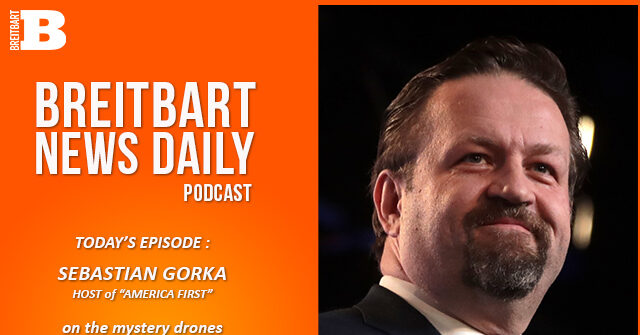Dr. Sebastian Gorka, a notable figure in the realms of counterterrorism and national security, recently gained recognition for his appointment as Deputy Assistant to the President and Senior Director of Counterterrorism under President-elect Donald Trump. Gorka, known for his strong opinions and expertise, took to the airwaves during an episode of the “Breitbart News Daily Podcast,” hosted by Mike Slater. Their conversation centered around a pressing and enigmatic issue: unexplained drone sightings. These sightings have sparked a mix of curiosity and concern among both officials and the general populace, raising questions about security and the implications of such technology.
When examining the phenomenon of drone sightings, various factors surface that contribute to the intrigue and apprehension surrounding them. Gorka noted that these incidents could potentially pose significant risks. He pointed to the advanced capabilities of modern drones, which can be equipped for surveillance, delivery of payloads, or even offensive operations. This versatility can be exploited by individuals or groups with malicious intent, raising fears about privacy violations and potential attacks. Gorka emphasized the importance of adequately addressing these threats, as they could impact national security and the safety of citizens.
Additionally, the dialogue touched upon how governmental and military agencies are adapting to the evolving landscape of drone technology. Gorka highlighted efforts to develop counter-drone measures, which include detection systems and defense strategies aimed at neutralizing unauthorized or hostile drones. He asserted that it is crucial for authorities to stay ahead of technological advancements to mitigate both the risks and possible attacks associated with drones. The conversation underscored a growing need for an integrated approach to regulate and monitor drone usage to enhance public safety.
Public reaction to these drone sightings has been largely mixed, with some expressing fascination and others alarm regarding their implications. Gorka remarked that while many drones are used for recreational purposes or legitimate deliveries, the potential for misuse remains. This sentiment reflects broader societal concerns about privacy and the surveillance capabilities of drones, as well as the risks they pose to public safety. Thus, it’s imperative for policymakers to engage in a comprehensive discussion regarding regulations that can effectively govern drone operations without stifling innovation and legitimate usage.
Through the podcast, Gorka also reiterated the significance of public awareness surrounding the discourse on drones. He believes that citizens need to be informed about the potential threats posed by drones to foster a culture of vigilance and accountability. Encouraging public engagement in discussions about technology and security can lead to better-informed decisions and policies. Moreover, fostering a responsible narrative around drone usage could mitigate fears while ensuring safety and security in communities.
In conclusion, the complex nature of drone sightings requires a multifaceted approach involving public discourse, government regulations, and technological advancements in countermeasures. As part of his role in the Trump administration, Gorka aims to contribute to shaping policies that address the challenges posed by this evolving threat. The conversation between Gorka and Slater serves as a microcosm of broader concerns in contemporary society regarding technology’s double-edged sword, emphasizing the need for vigilance, awareness, and proactive strategies in the face of unpredictable changes in the aerial landscape.

